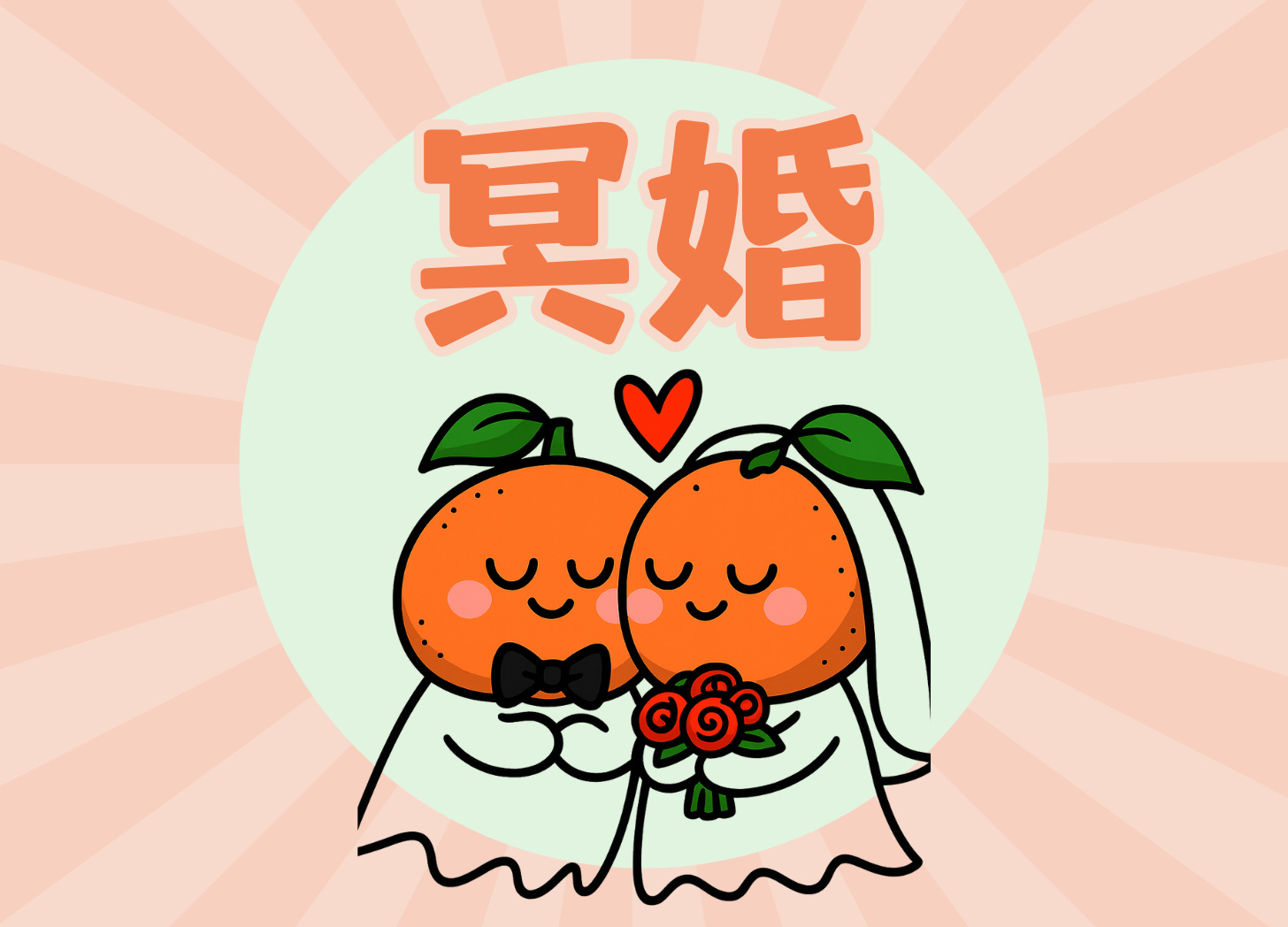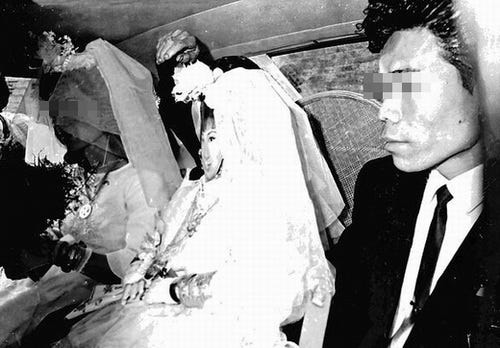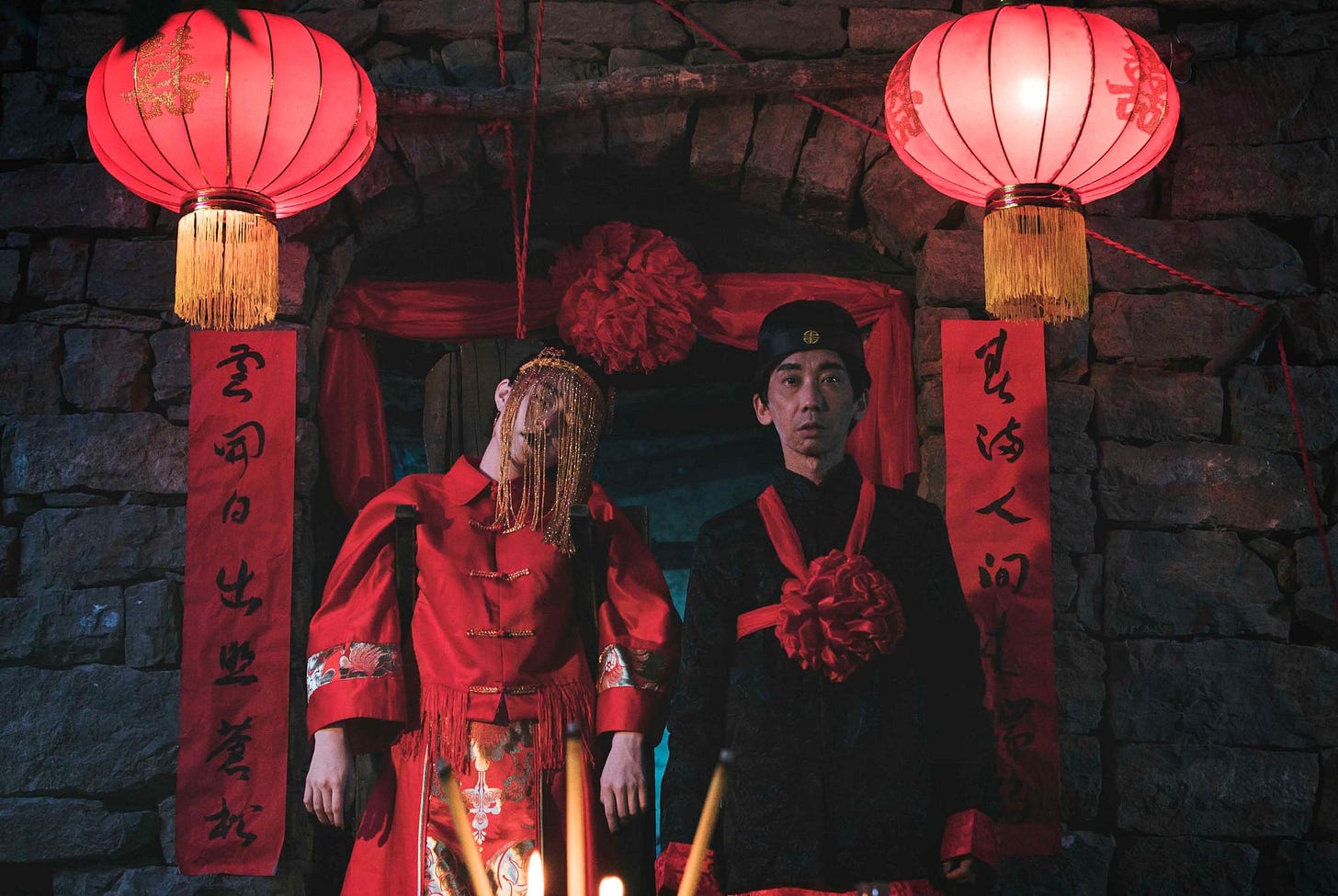Spirit Marriage: Could You Marry a Dead Person?
Some People in China and Taiwan Do, and the Reasons Vary
You got the title right! Ed and Lorraine Warren from The Conjuring would lose their minds! Would you risk being haunted for life by marrying a ghost?
This practice is called “spirit marriage” (冥婚). Sometimes it involves the union of two deceased individuals, but in some cases, a living person is married to someone who has passed away.
The history of this practice is complex, dating back centuries. While less common today, it is still practiced in some communities across Greater China.
Let’s dive in and learn more about this unique tradition!
中华地区对鬼魂有很多特别的习俗,而一些人认为,最能够超渡鬼魂的方法——尤其是生前未有结婚的亡灵——是安排冥婚。
鬼魂 (guǐhún): ghost
亡灵 (wánglíng): spirit of the deceased / the departed
冥婚 (mínghūn): spirit marriage / ghost marriage
There are many special customs regarding spirits in the Chinese region, and some people believe that the most effective way to appease ghosts—especially those who died unmarried—is to arrange a “spirit marriage.”
冥婚是传统中国习俗,其中经典《周礼》就已经记载迁葬之风俗。一些学者更认为冥婚的历史甚至可追溯至商朝,即是说冥婚或有三千多年的历史。
在古时,冥婚是安排两名已逝世的男女结婚、合葬。但随着时间及风俗的改变,也出现了在生人和死人之间的冥婚。
迁葬 (qiānzàng): reburial / moving a grave
追溯 (zhuīsù): to trace back / to date back to
商朝 (Shāng cháo): Shang Dynasty
逝世 (shìshì): to pass away / to die
Spirit marriage is a traditional Chinese custom, with the classic text Zhou Li already recording practices of posthumous burial. Some scholars believe that the history of spirit marriage can even be traced back to the Shang Dynasty, meaning it may have a history of over three thousand years.
In ancient times, spirit marriages were arranged between two deceased individuals, who were then buried together. Over time and with changes in customs, marriages between the living and the dead also emerged.
冥婚与中国古老婚姻习俗十分类似,大多数冥婚的新郎、新娘生前都不认识对方。不过,冥婚也要讲求门当户对,双方年龄、家境也是考虑因素。风水师傅也会担当鬼媒人,撮合双方。
冥婚中,鬼新娘的家人也会向男家要求礼金,也会提供嫁妆——但这些嫁妆当然都是纸扎用品,例如是纸扎珠宝、佣人甚至大宅。
新郎 (xīnláng): groom
新娘 (xīnniáng): bride
讲求门当户对 (jiǎngqiú méndāng hùduì): to emphasize marrying someone of equal social/economic status
鬼媒人 (guǐ méirén): ghost matchmaker / spirit matchmaker
礼金 (lǐjīn): gift money / bride price
嫁妆 (jiàzhuāng): dowry
纸扎 (zhǐzhā): paper offerings / paper models (for funerals or spirits)
佣人 (yōngrén): servant / domestic helper
Spirit marriage is very similar to traditional Chinese marriage customs. Most grooms and brides did not know each other in life. However, compatibility is still important, considering factors such as age and family background. The feng shui master often acts as a matchmaker for the deceased.
In a spirit marriage, the deceased bride’s family may request a bride price from the groom’s family and provide a dowry—but these dowries are made of paper, such as paper jewelry, servants, or even houses.
黄应春在2008至2010期间在山西曾进行田野研究,发现一具年轻女尸的价钱可达三万至五万人民币。他估计,现时女尸价格涨至八万至十万元人民币。
有分析指,中国男女比例严重失衡,尤其是在农村地区,是导致女尸价格不菲的原因之一。
田野研究 (tiányě yánjiū): field research / fieldwork
失衡 (shīhéng): imbalance / to be out of balance
不菲 (bùfěi): considerable / not cheap / substantial (usually referring to money or cost)
Between 2008 and 2010, Huang Yingchun conducted field research in Shanxi and found that the price of a young female corpse could reach 30,000 to 50,000 RMB. He estimates that today the price has risen to 80,000–100,000 RMB.
Some analysts point out that the severe gender imbalance in China, especially in rural areas, is one reason why female corpses fetch high prices.
在中国其他地区,冥婚已经日渐息微,不过在山西等地,这种奇特的习俗现今仍然流行。有分析指,山西产煤,不少年轻男子从事煤矿行业,偏偏煤矿工意外率高,不少未婚男子因意外离世。丧亲的父母可以透过安排冥婚,为死去儿子做一点事情,以求安慰、心安理得。
日渐 (rìjiàn): gradually / day by day
息微 (xīwēi): fading / dwindling / near extinction
产煤 (chǎnméi): coal production / to produce coal
煤矿行业 (méikuàng hángyè): coal mining industry
丧亲 (sàngqīn): losing a loved one / bereavement
心安理得 (xīn ān lǐ dé): to feel justified / to have a clear conscience
In other parts of China, spirit marriage has gradually declined, but in Shanxi and similar areas, this peculiar custom is still popular. Analysts suggest that because Shanxi produces coal, many young men work in mines, which have high accident rates, leading to many unmarried men dying in accidents. Bereaved parents can arrange a spirit marriage for their deceased son as a way of doing something for him, providing comfort and peace of mind.
黄景春也指出,不少中国人相信死者遗憾没有弥补的话,鬼魂会作崇令家宅不安,甚至带来厄运。假如死者未有结婚,为亡灵举行冥婚仪式会令他们的灵魂得到真正安息。为先人举行冥婚后,在生的人也能继续安心生活。
遗憾 (yíhàn): regret / unfortunate
弥补 (míbǔ): to make up for / to remedy
作崇 (zuòchóng): to play tricks / to cause trouble / to act up
厄运 (èyùn): misfortune / bad luck
仪式 (yíshì): ceremony / ritual
Huang Jingchun also noted that many Chinese believe that if a deceased person’s regrets are not resolved, their spirit may cause disturbances or even bring misfortune to the household. If the deceased were unmarried, holding a spirit marriage can bring their soul true peace. After performing a spirit marriage for ancestors, the living can continue to live with peace of mind.
在台湾,生人和死人之间的冥婚比较流行。台湾盛行的冥婚称“娶神主”。当一名单身女性逝世,她的家人可能会放一些红包在路上,有待有缘男性捡到红包。这些红包里面可能有现金、纸钱、死者的头发或指甲等。
假如男性在路上捡到这些红包,代表他有缘成为新郎。假如男性拒绝娶鬼妻的话,不少人认为会招来噩运。
“娶神主”仪式与一般结婚仪式类似,不过与中国大陆不同,没有“起骨”的仪式。有趣的是,“娶神主”的男性可以再婚,但必需尊“鬼妻”为大老婆。
盛行 (shèngxíng): to be prevalent / to be in fashion / widespread
娶神主 (qǔ shénzhǔ): to marry a spirit tablet (ritual of marrying a deceased person’s soul)
有缘 (yǒu yuán): to be fated / to have a predestined connection
招来噩运 (zhāo lái èyùn): to bring misfortune / to invite bad luck
起骨 (qǐgǔ): exhumation / to dig up a grave
In Taiwan, spirit marriages between the living and the dead are more common. The Taiwanese practice is called “marrying the ancestral tablet.” When a single woman dies, her family might place red envelopes on the street, waiting for a fated man to pick them up. These envelopes may contain cash, joss paper, or even the deceased’s hair or nails.
If a man picks up one of these envelopes, it signifies that he is fated to be the groom. Many believe that if he refuses to marry the ghost bride, it may bring misfortune.
The “marrying the ancestral tablet” ceremony is similar to a regular wedding, but unlike in Mainland China, there is no “exhumation” ritual. Interestingly, the man can remarry, but he must still regard the ghost wife as his primary spouse.
然而,冥婚也可以赚人热泪——李宗典是今年2月台南地震的幸存者。他在倒塌的维冠大楼内被困55小时后获救。据台湾公共电视报道,李先生7月份会见记者时说,他将与事发时死在他身旁的女友冥婚。
赚人热泪 (zhuàn rén rè lèi): to bring tears to people’s eyes / heart-wrenching
幸存者 (xìngcún zhě): survivor
倒塌 (dǎotā): to collapse / to fall down
获救 (huòjiù): to be rescued / to receive rescue
However, spirit marriage can also evoke heartfelt emotions—Li Zongdian, a survivor of the Tainan earthquake in February, was trapped for 55 hours in the collapsed Weiguan building and rescued. According to Taiwan Public Television, in July he told reporters that he would hold a spirit marriage with his girlfriend, who died beside him during the disaster.
一些情侣因为意外天人两隔,或许选择通过冥婚仪式去给死去的男友或女友一个名分。司徒法正说:“这种仪式在冥婚当中,是最升华的模式。”
情侣 (qínglǚ): couple / romantic partners
天人两隔 (tiān rén liǎng gé): separated by heaven and earth / worlds apart (used to describe lovers separated by death)
名分 (míngfèn): social/family recognition of a relationship / status of a marriage or relationship
升华 (shēnghuá): to sublimate / to elevate / to transform into a higher state
Some couples, separated by untimely death, may choose a spirit marriage to give the deceased partner a formal status. Szeto Fat-ching said: “This type of ceremony is the most elevated form of spirit marriage.”
Do you have a similar tradition in your culture? Would you consider marrying a deceased person?
Antoine & Dorota










There is no such practice in my culture since a marriage can only be agreed on in person and not by proxy. Though there are several rituals practiced if a beloved person dies. They too give relatives and friends peace of mind, and the deceased's (last) whishes are tried to be fulfilled and followed.
I first became aware of a 冥婚 due to the TV series "The Ghost Bride", a concept which was completely new to me.
Good read